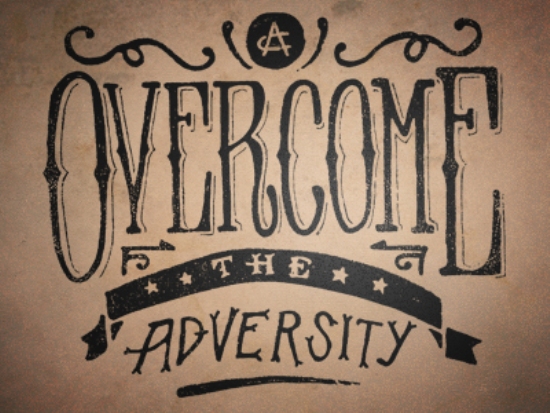Warning: Parameter 2 to wp_hide_post_Public::query_posts_join() expected to be a reference, value given in /home/fearlessmen/public_html/wp-includes/class-wp-hook.php on line 310
What is Adversity Quotient or “AQ”? It’s a measurement of a person’s resilience, such as IQ is one way to measure a person’s intelligence: Intelligence Quotient.
While “AQ” is IQ’s lesser known cousin, it’s not necessarily any less important.
Understanding your Adversity Quotient is quite important. It tells a lot about you, your drive against obstacles obstructing your endeavors, and how resilient you’ll be during trying circumstances.
Resilience-Why growing your Adversity Quotient is critical
Adversity Quotient is how you respond to life–especially the hard stuff. It’s a gauge and a measure of how you deal with everything from stress at home, to work, the small hassles and the “big deals” that come your way on a daily and also rare basis.
The more resilient you are, the more constructively and effectively you can respond to and work through life difficulties. Having this resilience, this ability to handle adversity, also makes life more fulfilling. You aren’t so easily dragged down by tough situations.
The Science of Adversity Quotient
I can’t get too in depth about it here, but there are direct links between your “neurophysiology” and “cognitive phycology”. Meaning there is a direct link between how you respond to adversity and your mental and physical health. The more poorly your respond to it, the less mentally, and even physically healthy you will be. The opposite is also true. This is called “phychoneuroimmunology”.
Control is essential to longevity, health and fulfillment. Out of control people are unhappy, make others unhappy, and usually lead a shorter life.
Growing and Improving Your AQ
The brain is ideally formed to create habits. The habits you have don’t have to be the same. You can start to change them immediately.
A person’s response to adversity doesn’t have to stay the same. It can be changed, and gradually and immediately improve.
Think of it as “interrupting” your old habits. Interrupt your old response to adversity.
We respond to adversity in constant, subconscious patterns. We have to receive feedback from others and give ourselves transparent feedback to become more self-aware about our lacking adversity quotient. Once you realize and identify how you respond to adversity, and what types of adversity you respond poorly too, you can “interrupt” your pattern of response.
What’s the number one thing you can do to improve your Adversity Quotient?
Get feedback from people. Pray and process about what adverse circumstances drag you down. Think through how you can interrupt your fixed response patterns. Left unchecked, these patterns will remain with you for a lifetime.
Take an Adversity Quotient test. These are real tests that give you a number score just like the IQ test. Taking will tell you a lot about yourself you may have not known!
READERS: After we published this the author who spent decades devoting his life to researching, studying, and publishing about Adversity Quotient commented below. Please visit Dr. Paul Stoltz’s website www.peaklearning.com. If you are interested in taking the AQ test, he suggests you email them directly at info@peaklearning.com to get set up!
A Picture of Resilience–Beck Weathers
Beck Weathers made a trip to ascend Mount Everest in May of 1996. As you can tell by the photo below, he is the epitomy of a man with a high Adversity Quotient. Everything went wrong on his trip.
Beck Weathers had corrective eye surgery years before. His eyes response to the extremely thin oxygen levels near the highest summit on Earth was “snow blindness.” Beck couldn’t see more than 3 feet in front of him. His guide, Rob Hall, made him agree to not ascend to the summit and wait for him till he got back.
Another group of climbers returning down from a whiteout storm came upon Weathers. They decided to help him down, but a storm with 70 mph winds forced them to merely huddle together for warmth. During a lull of the storm one man went back to camp for assistance. Hours later help returned, but decided Beck and one other were too unresponsive (comatose) and they were left for dead.
Weathers slept through the night, and was found in the morning by two sherpas who chipped pieces of ice off his face. They were shocked to find him still breathing. He was eventually air-lifted in the highest-altitude helicopter rescue up to that time.
He survived with blindness to one eye and severe frostbite to his face and both hands.
Here’s the most vivid, and extreme, picture of a person’s Adversity Quotient that I can quote:
[quote]I was lying on my back in the ice. It was colder than anything you can believe. I figured I had three or four hours left to live, so I started walking. All I knew was, as long as my legs would run, and I could stand up, I was going to move toward that camp, and if I fell down, I was going to get up. And if I fell down again, I was going to get up, and I was going to keep moving until I either hit that camp, I couldn’t get up at all, or I walked off the face of that mountain.
-Beck Weathers
[/quote]
“Overcome” photo courtesy of http://dribbble.com/joehoracek
“Beck Weathers” photo credit Ed Visteurs

Great post Todd! I love the quote at the end, what a picture of not giving up!
I know! I did find the picture disturbing though–I almost considered not included it!!
Interesting method of quantifying something with so many variables. Great job with the the Beck Weathers example.
It’s true, there are so many variables, but also the same with intelligence. One critique of the IQ measurement is that it doesn’t accommodate measuring intelligence when it comes to talents–musical intelligence, military intelligence, or the genius of a person like Michael Jordan.
I think I have a pretty high AQ, I pretty much roll with the punches and keep on going. I first really discovered this when competing in a sport that really stressed the pucker factor to the max. I excelled at it not because I had natural skills, but because when the buzzer for the timer went off, I was able to separate myself from my emotions, assess the situation and “handle it”. (The sport involved solving highly challenging tactical situations, I’ll leave it at that.) .
One thing with having what I believe is a high AQ is that although I get angry, I’m not emotional about it. My wife calls me passive, I explain to her that I’m really not, I just refuse to get upset about much of the crap that doesn’t really matter and deal with those minor annoyances in my own way. I’ll have to find an online AQ test now……..
I haven’t actually taken an AQ test either. I’m curious if I would score higher now than a few years ago, or lower. I seemed to “put up” with more back then. It makes me wonder was my AQ higher then, or actually higher now b/c I process bullshit I’m not willing to take and shoot it down, even if it’s from above.
My AQ is probably pretty low. Personally I aspire to little more than an average, middle-class life.
I don’t have the energy or love of money to aim to accumulate massive wealth either. But that doesn’t mean we don’t do well facing adversity.
I really enjoyed reading this post. All I can say is wow, Beck Weathers has amazing fortitude. Although I have not overcome extreme adversity, I would like to think I have a somewhat high AQ (although if I actually took the test, I may get a different answer). I may complain a lot when the going gets tough, but I put up with it and persevere.
Yes! We obviously could pick any fight for your life story and comparing it to our day to day living is a bit of a broken analogy. But I loved his quote so much, that I had to share his story! I think I’m going to do a full article on him soon.
“Into Thin Air” by Jon Krakauer chronicles this disasterous trip up Mt. Everest. I highly recommend this short book. It’s an amazing story.
Thanks for the reference! I want to learn more about him and write a piece on Beck Weathers overcoming fear.
Great article, thanks for honoring my life’s work on AQ®, putting it to such good use. Anyone who wants to measure their AQ, the tool is called the AQ Profile®. Send a note to info@peaklearning.com. We’ll get you set up.
Climb Strong,
Paul G. Stoltz, PhD.
Author, “Adversity Quotient”
Founder and CEO of PEAK Learning, Inc.
Dr. Paul,
I’m honored you tracked this down! Thank you so much for adding to the conversation! The test your refer to looks like an excellent resource for readers, I’ll make sure to edit and refer to this in the article.
My best,
Todd
Paul,
Is this offer for AQ Profile still good? If so, I’ve reached out to get “set-up”.
Thanks!
Jim Gaffney
Beautiful read! Reading AQ before has changed my mindset. I have learned to be more in control, accountable, and perseverant. Thanks!